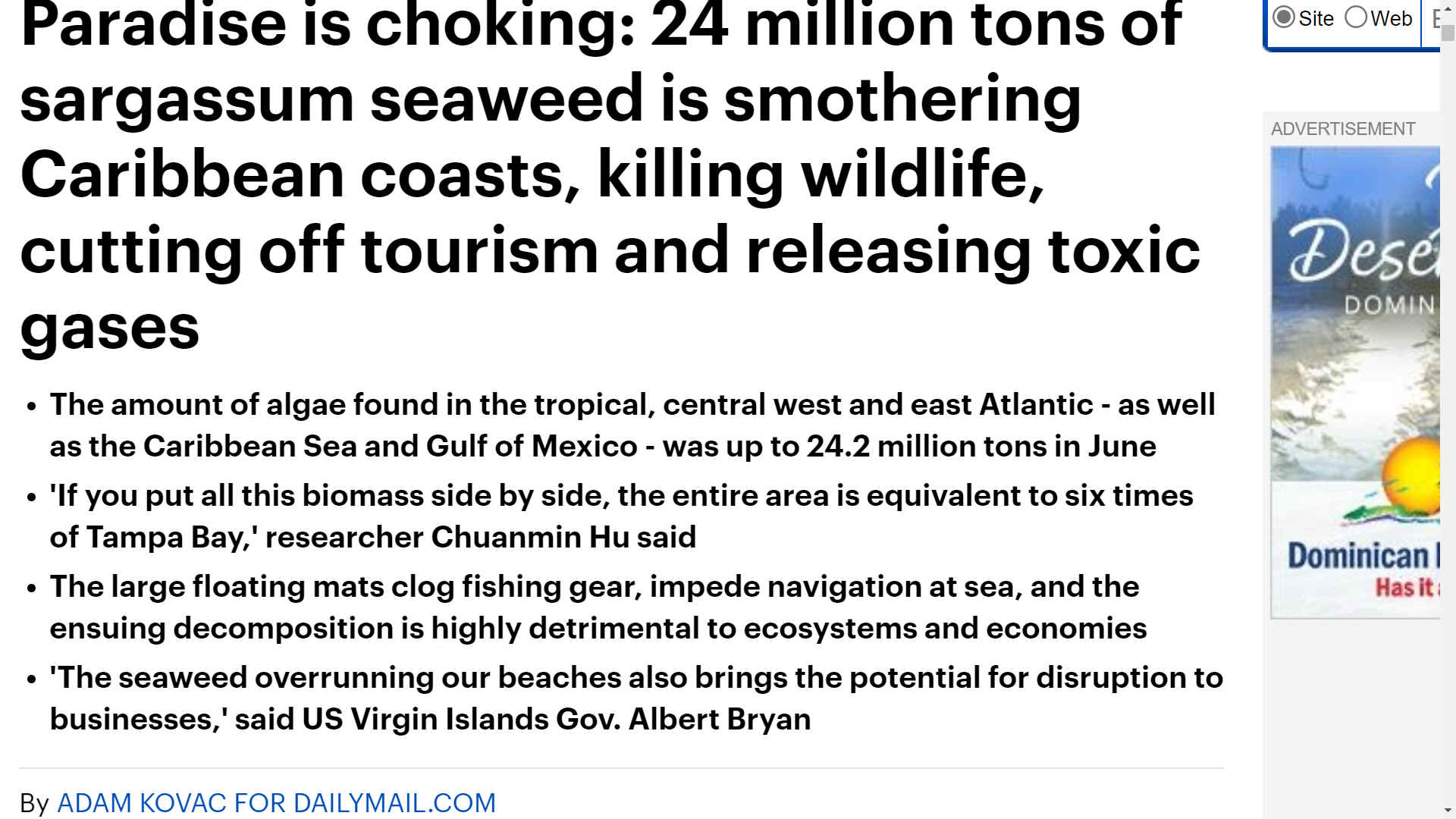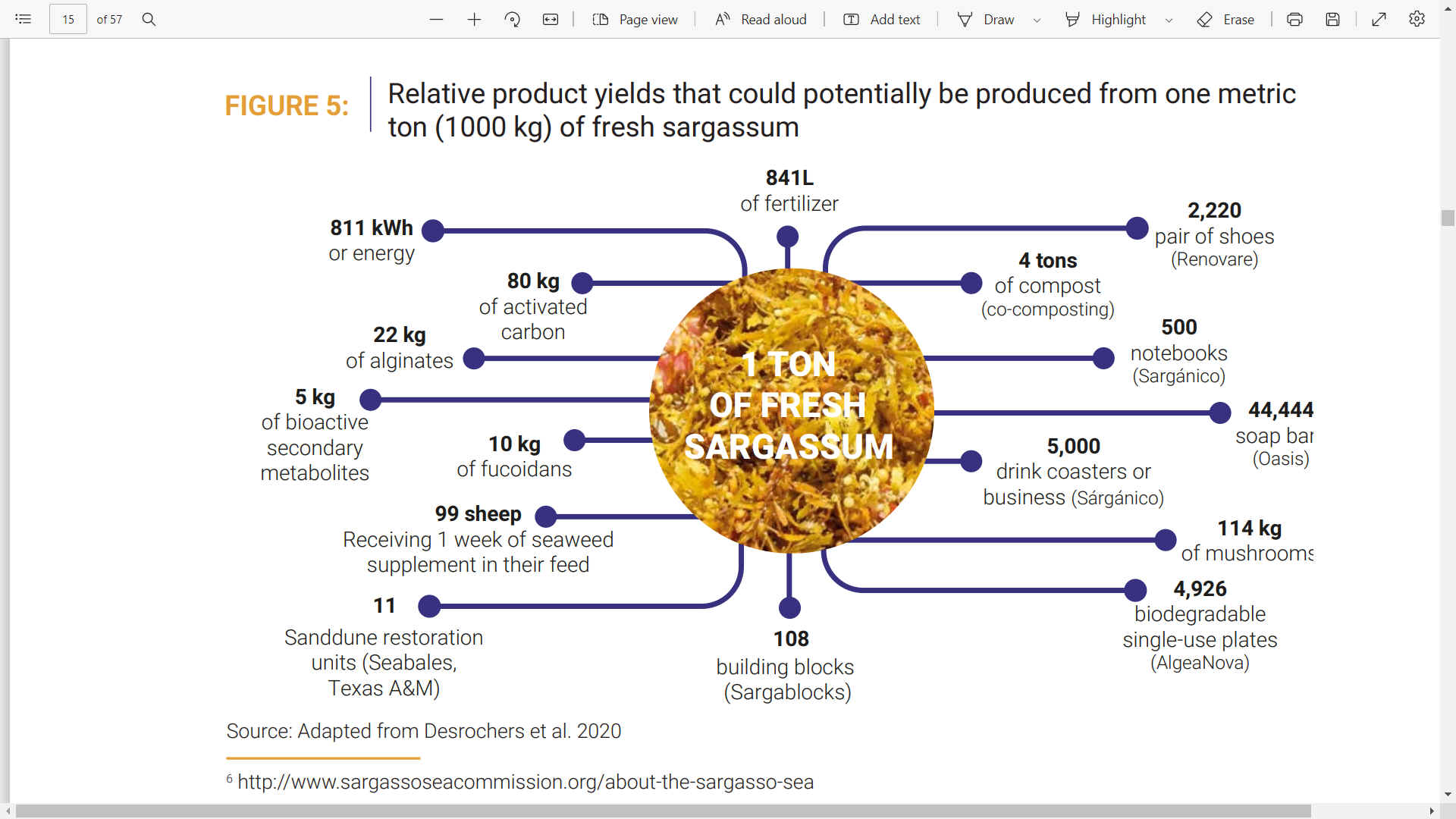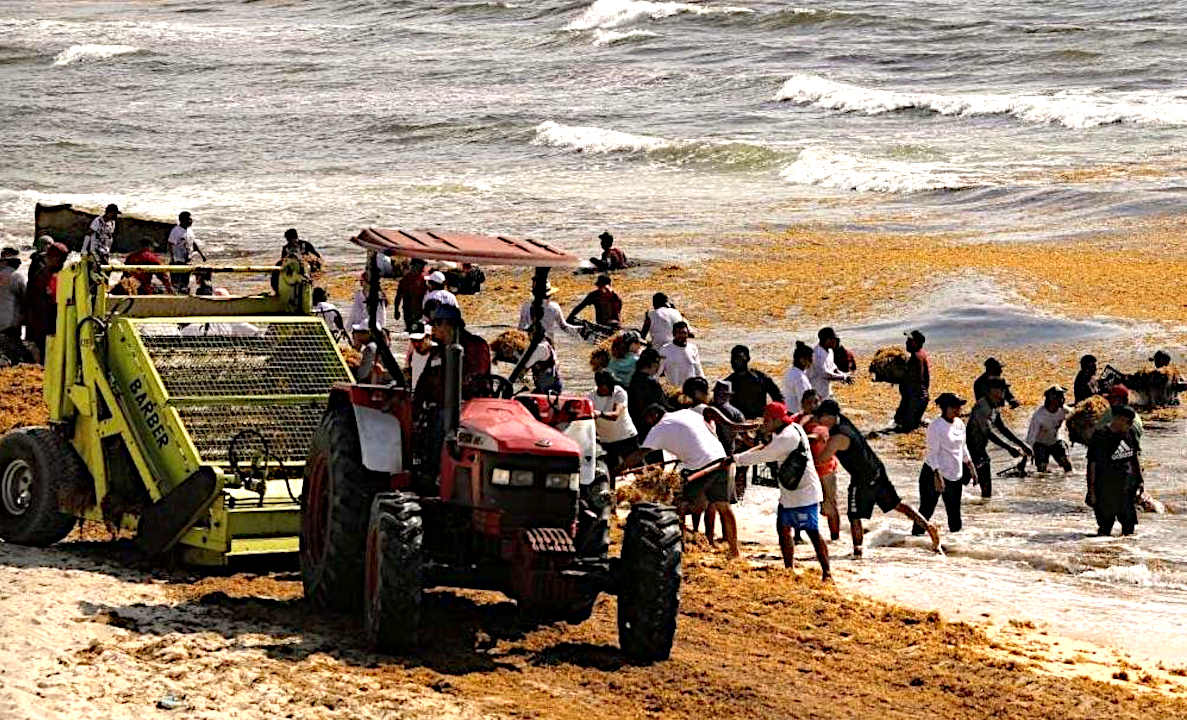
Paradise is choking: 24 million tons of sargassum seaweed is smothering Caribbean coasts, killing wildlife, cutting off tourism and releasing toxic gases
- The amount of algae found in the tropical, central west and east Atlantic - as well as the Caribbean Sea and Gulf of Mexico - was up to 24.2 million tons in June
- 'If you put all this biomass side by side, the entire area is equivalent to six times of Tampa Bay,' researcher Chuanmin Hu said
- The large floating mats clog fishing gear, impede navigation at sea, and the ensuing decomposition is highly detrimental to ecosystems and economies
- 'The seaweed overrunning our beaches also brings the potential for disruption to businesses,' said US Virgin Islands Gov. Albert Bryan
Forget sea monsters and tidal waves. Beachgoers and fishermen alike are having their summers ruined by something far less cinematic: record amounts of foul-smelling 'sargassum' seaweed that have inundated huge swaths of
Atlantic Ocean shoreline.
The amount of algae found in the tropical, central west and east Atlantic - as well as the
Caribbean Sea and
Gulf of Mexico - was up to 24.2 million tons in June. That's an increase from 18.8 million tons a month prior and a record high.
'If you put all this biomass side by side, the entire area is equivalent to six times of Tampa Bay,' Chuanmin Hu, a researcher from the University of South Florida who studied the phenomenon, told DailyMail.com.
The gigantic amounts of sargassum on beaches and close to the shore have put a damper on tourism and the Caribbean's vital
fishing industries.
The Sargassum Monitoring Network’s most recent update, shown here, reveals that there are currently 18 beaches in Mexico with excessive amounts of seaweed.
The situation has gotten so bad that in July, U.S. Virgin Islands Governor Albert Bryan Jr. declared a state of emergency.
In a statement, Bryan said 'the seaweed overrunning our beaches also brings the potential for disruption to businesses and other negative financial impacts to our economy.'
A day later, President Joe Biden declared a state of emergency in the territory, citing the threat that clogs of sargassum in the
U.S. Virgin Islands’ desalination plants pose to the territory’s fresh water supply.
Once washed ashore, rotting sargassum not only smells terrible but also poses a health problem, with researchers saying it can emit toxic gases that can give humans heart palpitations, shortness of breath, dizziness and other symptoms.
In a 2019 paper for the journal Science, a team of researchers found that sargassum, which was usually more predominant in northern parts of the Atlantic, had become increasingly common in the south since 2011. Hu said there are several reasons as to what sparked that spread, including unusually strong winds and currents the year before.
The southern portion of the Atlantic, with its ample sunshine and nutrient-rich waters, proved to be a fertile ground for sargassum, leading to the current crisis.
Although it wreaks havoc to land-based industries, the United Nations Environment Programme says the seaweed itself isn’t a problem, since it can provide a happy habitat and feeding ground for a variety of sea creatures ranging from
crabs to
dolphins to an assortment of eels and
fish.
Rather, it’s 'the large floating mats clogging fishing gear and impeding
navigation at sea, and the mass stranding on coastlines and ensuing decomposition that is highly detrimental to people, ecosystems, and economies.'
Hu agreed sargassum largely poses no problem while at sea, but said there is some evidence that the vast amounts of seaweed could pose a problem if huge amounts of it were to die and sink to the bottom of the ocean, where it could smother
coral reefs and other environments.
For those hoping for seaweed-free Caribbean beaches in future summers, Hu said not to set your expectations too high and that massive sargassum blooms in the
waters are likely a 'new normal.'
Hu noted that sargassum has many uses, from being turned into fertilizer,
bricks and
tennis shoes to being tossed in a salad - so perhaps there's some type of opportunity in this crisis.
DECLARATIONS OF EMERGENCY
The unprecedented scale of the Sargassum influxes also led to declarations of emergency conditions in several Caribbean countries e.g.
Tobago in 2015,
Barbados in 2018, and
Mexico in 2019 (Chavez et al. 2020).

LINKS
https://www.dailymail.co.uk/sciencetech/article-11081317/Caribbean-shores-choked-record-seaweed-thats-killing-wildlife-cutting-tourism.html
https://www.dailymail.co.uk/sciencetech/article-11081317/Caribbean-shores-choked-record-seaweed-thats-killing-wildlife-cutting-tourism.html



